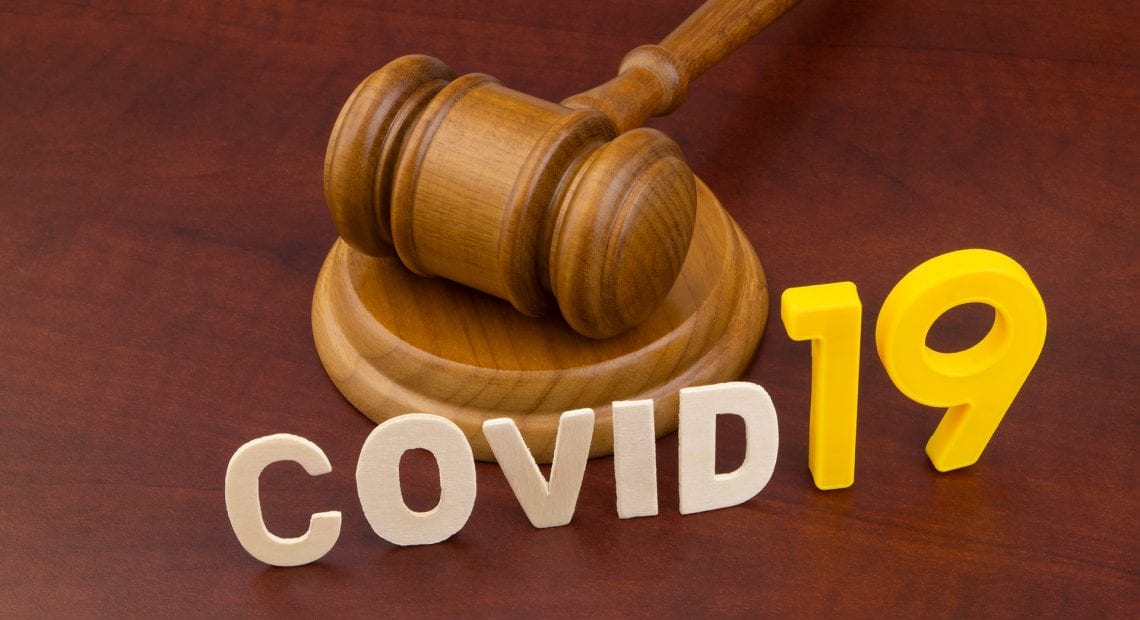The Bottom Line
By Michael A. Fenton, Esq. and Mark J. Esposito, Esq.
The COVID-19 pandemic has touched the lives of billions across the globe. In Massachusetts, Gov. Charlie Baker recently extended an emergency order directing that all non-essential businesses cease in-person operations and banning large gatherings.

Michael A. Fenton, Esq.

Mark J. Esposito, Esq.
With each closure, cancellation, or indefinite postponement comes a flurry of legal questions pertaining to contract law. Indeed, the postponement of the comic-book convention scheduled to take place in Boston in March has already resulted in a lawsuit stemming from a disagreement over a contract.
This article focuses on how contracting parties may be excused from certain obligations due to COVID-19.
To a great extent, businesses are in uncharted waters. The last comparable public-health emergency occurred more than 100 years ago: the Spanish Flu of 1918-19. Partly as a result of that rarity, instructive legal precedents are also few and far between. In these unprecedented times, the often-overlooked doctrine of impossibility of contract and the underlying legal concept of force majeure are positioned to play primary roles in the interpretation of contracts during the coming weeks and months.
Doctrine of Impossibility of Contract
The doctrine of impossibility of contract may be raised as a defense in response to a lawsuit seeking to enforce a contract. Under the legal theory, if both parties entered into the contract assuming that a certain state of facts would continue to exist, and that assumption turned out to be wrong, without the fault of either party, the obligation to perform under the contract would be excused (Chase Precast Corp. v. John J. Paonessa Co. Inc., 409 Mass. 371, 373 [1991]). While the doctrine of impossibility of contract may be (somewhat) succinctly summarized, it is not necessarily so easy to interpret in practice.
The circumstances triggering the doctrine of impossibility need not be written into an agreement in order for the doctrine to apply. However, the applicability of the legal theory can be expressed in a contract through what is called a force majeure clause.
Force Majeure
Black’s Law Dictionary defines force majeure as “an event or effect that can be neither anticipated nor controlled; esp., an unexpected event that prevents someone from doing or completing something that he or she had agreed or officially planned to do. The term includes both acts of nature (e.g., floods and hurricanes) and acts of people (e.g., riots, strikes, and wars).” Force majeure intersects with the doctrine of impossibility when a contract cannot be performed as intended because of a war, natural disaster, or the like.
The general definition of force majeure can be customized in an individual contract. Each contract should be reviewed carefully to determine how force majeure is defined, if at all, and to assess whether the current pandemic circumstances preclude enforcement of the contract obligations.
Force majeure clauses are clearly implicated if they explicitly include pandemics or public-health crises within the contractual definition, but what about less obvious situations? Does the COVID-19 crisis qualify as an unanticipated, uncontrolled ‘act of nature’ or ‘act of people’? The pandemic certainly is an unexpected event that is preventing a great many people from doing or completing a great many things. But an insurer being sued in Louisiana disagrees.
Which Applies?
In the midst of the current health crisis, parties with (and some without) a force majeure clause in their agreements find themselves wondering if the doctrine of impossibility of contract applies. Is a commercial tenant required to continue to pay rent to a landlord, when the leased premises have been ordered closed by the governor because of a public-health emergency? What rights does the landlord have in the same situation? Surely the tenant anticipated that it would be able to operate its business out of the space; otherwise, there would have been no reason to rent it. What specifically did the parties think at the time that they entered the agreement?
The general definition of force majeure can be customized in an individual contract. Each contract should be reviewed carefully to determine how force majeure is defined, if at all, and to assess whether the current pandemic circumstances preclude enforcement of the contract obligations.
The general definition of force majeure can be customized in an individual contract. Each contract should be reviewed carefully to determine how force majeure is defined, if at all, and to assess whether the current pandemic circumstances preclude enforcement of the contract obligations.
If the doctrine of impossibility of contract applies, whether through the express provisions of a force majeure clause or otherwise, contracting parties must determine what obligations are excused and to what extent. Most contracts will not be completely invalidated by a force majeure event. Rather, force majeure will operate to relax certain obligations based on the facts and circumstances (e.g., extending deadlines, waiving mandatory production requirements, abating rent, or other payments owed).
It is worth noting that many commercial leases have provisions that expressly define what qualifies as force majeure and narrowly enumerate what obligations can be excused under it. Many commercial leases state plainly that the tenant’s obligation to pay rent cannot be excused by triggering the force majeure provisions. Where losses are realized as a result of the doctrine of impossibility of contract and/or force majeure provisions in a contract, an aggrieved party might reasonably consult with their insurance carrier as business interruption insurance could conceivably be a useful tool in mitigating these losses. Unfortunately, insurance companies are almost uniformly denying such claims.
Uncertain Times
The COVID-19 pandemic has turned our lives upside down. While contractual obligations are the last thing many of us want to be thinking about during this time, it is an undeniable truth that business and professional obligations are on the minds of many as we struggle to honor our commitments. For some, the doctrine of impossibility of contract and force majeure contractual provisions may provide some measure of relief from obligations, while it will only further compound the damage for others who seek to enforce such obligations.
Michael A. Fenton, Esq. and Mark J. Esposito, Esq. are attorneys at Shatz, Schwartz and Fentin, P.C., and specialize in business and estate planning, commercial and tax-exempt bond financing, real estate, litigation, and bankruptcy; (413) 737-1131; ssfpc.com






